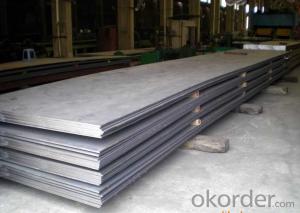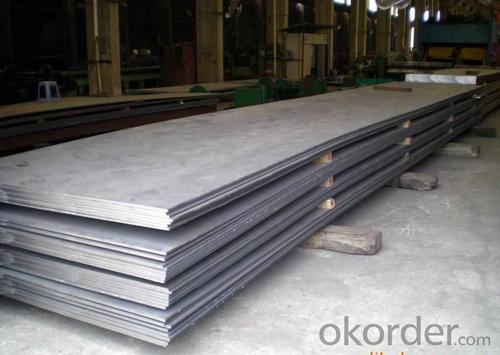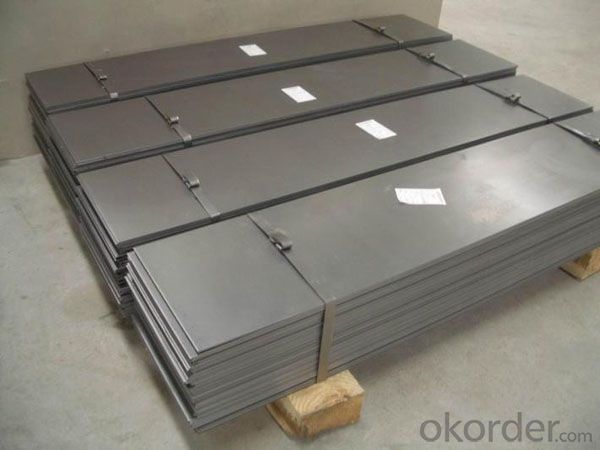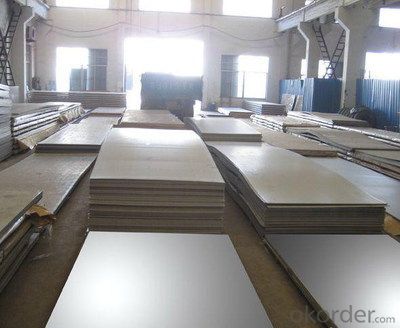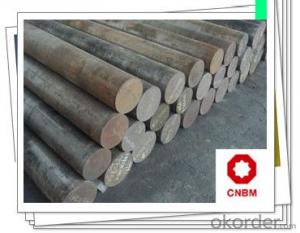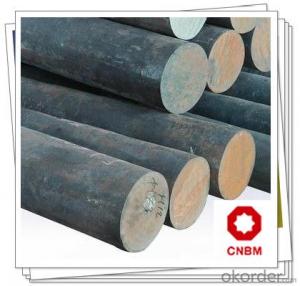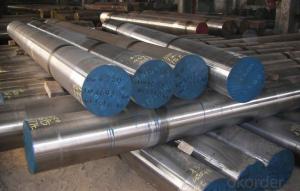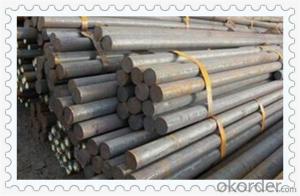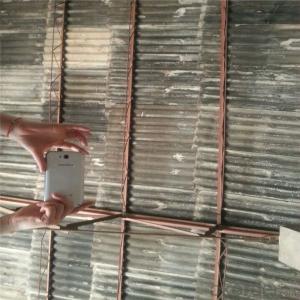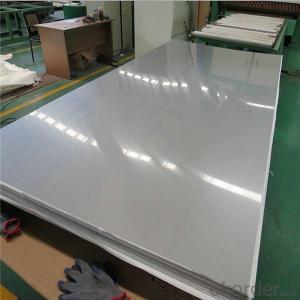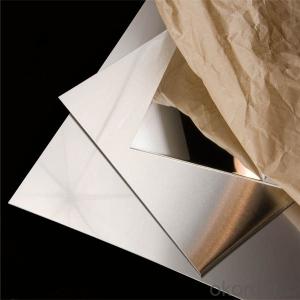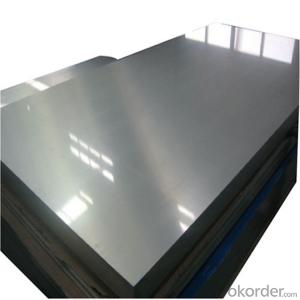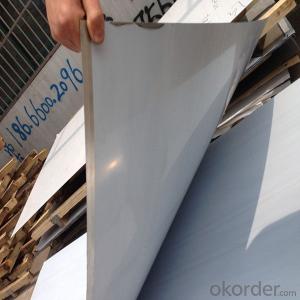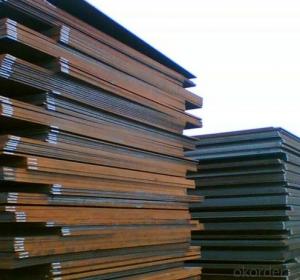2cr13/sus410/1.4021/410 Stainless Steel Plate
- Loading Port:
- China main port
- Payment Terms:
- TT OR LC
- Min Order Qty:
- 25 m.t.
- Supply Capability:
- 10000 m.t./month
OKorder Service Pledge
OKorder Financial Service
You Might Also Like
Specification
Chemical Composition(GB)%
| C | Si | Mn | Cr | P | S |
| 0.16 | ≤0.60 | ≤0.80 | 12.0-14.0 | ≤0.030 | ≤0.030 |
Standard
| GB | ASTM | DIN | JIS |
| 2Cr13 | 410 | 1.4021 | SUS410 |
Available Size
| Rolled plate | 12-120mm*720mm*6000mm | ||
| Module | 130-400mm*1000mm*6000mm | ||
Characterstics
| 1.High corrosion resistance and mirror performance | |||||
| 2.Higher strength and abrasion resistance |
Applications:Suitable for precise dies with super mirror performance and abrasion resistance,camera components,optical lens
Product show:

Workshop show:

FAQ:
1, Your advantages?
professional products inquiry, products knowledge train (for agents), smooth goods delivery, excellent customer solution proposale
2, Test & Certificate?
SGS test is available, customer inspection before shipping is welcome, third party inspection is no problem
3, Payment Terms?
30% TT as deposit and 70% before delivery.
Irrevocable L/C at sight.
4, Trading Terms?
EXW, FOB, CIF, FFR, CNF
5, After-sale Service?
We provides the services and support you need for every step of our cooperation. We're the business partner you can trust.
For any problem, please kindly contact us at any your convenient time.
We'll reply you in our first priority within 24 hours.
- Q: How are steel round bars used in the construction of tunnels and underground structures?
- Steel round bars are commonly used in the construction of tunnels and underground structures as reinforcement for concrete. These bars are placed within the concrete to provide strength and stability, preventing the structure from cracking or collapsing under pressure. The steel round bars also enhance the overall durability and load-bearing capacity of the tunnel or underground structure, ensuring its long-term structural integrity.
- Q: What is the tolerance for diameter in steel round bars?
- The tolerance for diameter in steel round bars can vary depending on the specific standards and requirements set by the manufacturer or industry. Generally, the tolerance for diameter in steel round bars is specified within a certain range to ensure the desired level of precision and consistency in the dimensions of the bars. This tolerance is usually expressed as a plus or minus value, indicating the acceptable deviation from the specified diameter. It is important to check the relevant industry standards or consult with the manufacturer to determine the specific tolerance for diameter in steel round bars, as it can differ based on the intended application and the manufacturing process used.
- Q: Can steel round bars be used in the chemical industry?
- Yes, steel round bars can be used in the chemical industry. Steel is a versatile material with excellent mechanical properties and corrosion resistance, making it suitable for various applications in the chemical industry. Steel round bars are commonly used for manufacturing equipment, such as reactors, tanks, and piping systems, where strength, durability, and resistance to chemical substances are important factors.
- Q: Can steel round bars be used for making transmission towers?
- Certainly, transmission towers can be constructed using steel round bars. The construction industry frequently utilizes steel round bars owing to their robustness, longevity, and adaptability. Transmission towers necessitate materials capable of enduring harsh weather conditions, accommodating hefty loads, and ensuring structural steadiness. Steel round bars effectively fulfill these criteria, rendering them a fitting option for erecting transmission towers. Moreover, steel round bars can be effortlessly fabricated and welded, permitting the swift and efficient construction and installation of transmission towers.
- Q: What is the typical price range for steel round bars?
- The typical price range for steel round bars varies depending on factors such as size, grade, and market conditions. However, generally speaking, steel round bars can range in price from $0.50 to $10 per pound.
- Q: Can steel round bars be heat treated for improved strength?
- Steel round bars can undergo heat treatment for enhanced strength. This treatment involves subjecting the steel to specific heating and cooling procedures to modify its microstructure and properties. The most common techniques used for heat treating steel round bars are quenching and tempering. During quenching, the steel round bar is heated to a high temperature and rapidly cooled by immersing it in a quenching medium like water, oil, or polymer. This rapid cooling aids in hardening the steel by transforming its microstructure into a tougher and stronger martensitic structure. Following quenching, the steel round bar is often tempered to reduce brittleness and increase toughness. Tempering includes reheating the quenched steel to a lower temperature and gradually cooling it. This process relieves the internal stresses formed during quenching and allows the steel to achieve a balance between hardness and toughness, resulting in improved strength. It is important to consider that the specific heat treatment process and parameters rely on the type and grade of steel used. Therefore, it is advisable to consult with a metallurgical expert or refer to the manufacturer's guidelines to determine the appropriate heat treatment process for a specific steel round bar and achieve the desired strength improvement.
- Q: What is the machinability of a steel round bar?
- The machinability of a steel round bar refers to its ability to be easily shaped, cut, and modified using various machining processes. It is a measure of how easily the steel material can be worked on with tools such as lathes, mills, drills, and other cutting or shaping tools. The machinability of a steel round bar is influenced by several factors, including the chemical composition of the steel, its microstructure, and any heat treatment processes it has undergone. Certain elements in the steel, such as sulfur, phosphorus, and lead, can improve or hinder machinability. Additionally, the presence of alloying elements, such as chromium, molybdenum, and nickel, can also impact the machinability of the steel. High machinability steel round bars are typically characterized by their ability to be easily cut, drilled, and shaped with minimal tool wear and power consumption. They also produce smooth, precise finishes with minimal surface defects. On the other hand, low machinability steel round bars are more difficult to work with, often requiring more power, specialized tools, and slower cutting speeds. It is important to consider the machinability of a steel round bar when selecting materials for machining applications. Factors such as the desired cutting speed, tool life, surface finish, and overall efficiency of the machining process should be taken into account. Additionally, the specific machining operations, such as turning, milling, or drilling, will also influence the choice of steel round bar with suitable machinability. Overall, the machinability of a steel round bar plays a crucial role in determining its suitability for various machining processes. Understanding the machinability characteristics of different steel grades can help in selecting the most appropriate material for specific machining applications, ensuring efficient and effective machining operations.
- Q: What are the different types of steel round bar finishes?
- There are several different types of steel round bar finishes available, each with its own unique properties and benefits. Some common types of steel round bar finishes include: 1. Hot Rolled: This finish is achieved by heating the steel to a high temperature and then rolling it while it is still hot. Hot rolled steel round bars have a rough surface and a blue-grey color. This finish is commonly used for structural applications where aesthetics are not a priority. 2. Cold Rolled: In contrast to hot rolled steel, cold rolled steel round bars are processed at room temperature. This results in a smoother surface and tighter dimensional tolerances. Cold rolled steel round bars are often used in applications that require a more polished look or where precise measurements are essential. 3. Turned and Polished: This finish involves removing the outer layer of the steel round bar through a process called turning. After turning, the bar is polished to achieve a smooth and shiny surface. Turned and polished steel round bars are commonly used in decorative applications or where a high-quality appearance is desired. 4. Ground: Ground steel round bars undergo a grinding process to remove imperfections and achieve a smooth, uniform surface. This finish is often used when tight tolerances and precise measurements are required, such as in machine parts or tools. 5. Chrome Plated: Chrome plating involves applying a layer of chromium onto the surface of the steel round bar. This finish provides enhanced corrosion resistance and a lustrous appearance. Chrome plated steel round bars are frequently used in applications where the material will be exposed to moisture or harsh environments. 6. Galvanized: Galvanizing is the process of coating steel with a layer of zinc to protect it from corrosion. Galvanized steel round bars have a characteristic silver appearance and are commonly used in outdoor applications or environments where rust is a concern. These are just a few examples of the different types of steel round bar finishes available. The choice of finish will depend on the specific requirements of the application, such as aesthetics, corrosion resistance, or dimensional tolerances.
- Q: What are the advantages of using case-hardening steel round bars?
- There are several advantages to using case-hardening steel round bars. Firstly, case-hardening steel round bars have a hardened outer layer or "case" while maintaining a relatively soft and ductile core. This allows for excellent wear resistance on the surface, making them ideal for applications where the material comes into contact with abrasive or erosive forces. The hardness of the outer layer also provides increased strength and durability, enhancing the lifespan of the round bars. Another advantage of case-hardening steel round bars is their ability to withstand high impact loads. The hardened outer layer provides a barrier that absorbs and disperses the impact energy, preventing deformation or breakage of the material. This makes them suitable for applications where the round bars are subjected to heavy loads or impacts, such as in machinery or construction equipment. Additionally, case-hardening steel round bars offer improved fatigue resistance. The hardened surface layer helps to distribute stresses evenly, reducing the likelihood of cracks or fractures developing under cyclic loading conditions. This makes them suitable for use in applications that require long-term durability and resistance to repeated stress, such as automotive components or gears. Furthermore, case-hardening steel round bars have excellent machinability. The soft and ductile core allows for easy cutting, drilling, and shaping, while the hardened surface provides the necessary wear resistance. This makes them cost-effective and efficient to work with, as they can be easily formed into various shapes and sizes to meet specific design requirements. In conclusion, the advantages of using case-hardening steel round bars include excellent wear resistance, high impact load resistance, improved fatigue resistance, and excellent machinability. These properties make them a versatile and reliable choice for a wide range of applications in industries such as automotive, construction, and manufacturing.
- Q: How are steel round bars used in the manufacturing of agricultural implements?
- Due to their durability, strength, and versatility, steel round bars are widely used in the manufacturing of agricultural implements. Typically made of carbon steel, these bars offer excellent resistance to wear and tear, making them ideal for heavy-duty applications in the agricultural industry. Plows, an essential tool for breaking up and turning over soil, heavily rely on steel round bars. These bars are used to construct the plow's main framework, ensuring it can withstand the high levels of force and pressure exerted during tilling. Similarly, harrows, which cultivate the soil after plowing, also benefit from the use of steel round bars. These bars provide the necessary strength to withstand rigorous use without bending or breaking, guaranteeing their longevity and effectiveness. Apart from plows and harrows, steel round bars find common usage in the fabrication of other agricultural implements like cultivators, seeders, and sprayers. These implements require sturdy and durable components to endure the demanding conditions of agricultural operations. Steel round bars provide the strength and structural integrity needed for these implements to perform their intended functions effectively. Furthermore, livestock equipment such as gates, fences, and cattle panels also rely on steel round bars. These components must be strong and robust to contain livestock and withstand their movements and force. Steel round bars fulfill these requirements, ensuring the safety and security of animals and the durability of the equipment. In conclusion, steel round bars play a crucial role in the manufacturing of agricultural implements. Their durability, strength, and versatility make them an ideal choice for creating sturdy and reliable equipment that can withstand the demanding conditions of the agricultural industry.
Send your message to us
2cr13/sus410/1.4021/410 Stainless Steel Plate
- Loading Port:
- China main port
- Payment Terms:
- TT OR LC
- Min Order Qty:
- 25 m.t.
- Supply Capability:
- 10000 m.t./month
OKorder Service Pledge
OKorder Financial Service
Similar products
Hot products
Hot Searches
Related keywords
